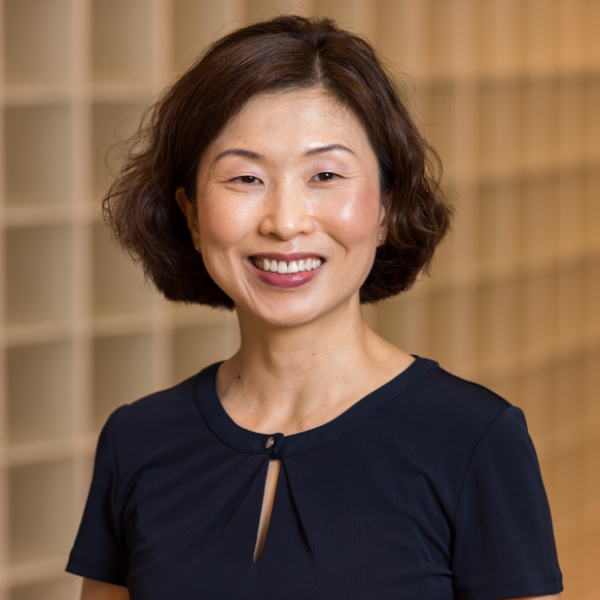Transplant Endocrine Clinic Celebrates First Anniversary; Highlights Contributions of Pharmacist in Interprofessional Practice

Jeong (Jamie) Park, PharmD, and her clinic team, Palak Upendra Choksi, MBBS, and Karen Greathouse, RD, celebrated the first anniversary of the University of Michigan Transplant Endocrine Clinic in September 2015. Dr. Park played a significant role, from realizing an important gap in patient care to designing and implementing this multidisciplinary clinic.
Over 30% of kidney transplant recipients at the University of Michigan Health System (UMHS) have diabetes as the primary or secondary etiology for renal failure. Additionally, 20% of patients are diagnosed with diabetes after transplant. Some of the medications that kidney transplant recipients need to take to prevent rejection make their blood glucose difficult to control and insulin requirements increase during the early post-transplant period. These medication changes warrant close monitoring of glucose and frequent adjustments of insulin regimens. Specifically, during the first 3 months post-transplant, patients are required to have post-transplant follow-up visits at the UMHS Taubman Center every 1-2 weeks. Due to limited time and access to primary care resources, management of diabetes during the early post-transplant period can be suboptimal.
To address this unmet need, the Transplant Endocrine Clinic opened within the UMHS Taubman Center in September 2014. The clinic was tasked with a primary goal of optimizing the management of diabetes in post-kidney transplant recipients during the transition time period post-transplant. The clinic provides comprehensive diabetes management with a team comprised of a pharmacist, an endocrinologist, and a dietitian. Patients are referred to the clinic by their transplant nephrologist within 3 months following transplant, and are followed by this multidisciplinary team for a minimum of 3 months. Once the patient’s diabetes care has stabilized, their diabetes management is transitioned to either the patient’s primary care provider or a local endocrinologist. Within the clinic, the multidisciplinary team delivers comprehensive and collaborative care to help patients achieve glycemic control and lifestyle changes, provides patient education and self-management goals and makes appropriate referrals for diabetic complications and comorbidities.
In addition to this important new clinic, Dr. Park is also launching a new teaching model into her practice. Her long-time experience working in interprofessional practice environments and strong commitment to educating and training students, residents, and new practitioners from various disciplines led her to be an early adopter of interprofessional education. She is pioneering efforts at the College to incorporate planned and intentional learning opportunities for interprofessional education into her experiential rotations, which will involve students from College of Pharmacy, Medical School, and School of Nursing. Her goal is for them to learn together to work together for better health outcomes for patients. While this model may sound like a traditional advanced pharmacy practice experience, it is different because students will learn together on the rotation via specific assignments and discussions.
“With the changes in healthcare delivery, pharmacists roles will likely expand to providing direct patient care and collaborating with other health care providers,” notes Dr. Park. “We need to integrate interprofessional educational experiences into the pharmacy curricula in order to better prepare students to meet the challenges. Fostering a habit of lifelong learning is also important as things taught in school today can be quickly outdated and pharmacists will be held accountable for current knowledge and technology at all times,” she explains.
Dr. Park received her Doctor of Pharmacy degree from the University of Iowa and completed a Transplantation/Immunology Fellowship at University of Washington and a Pharmacy Practice Residency at Barnes-Jewish Hospital before joining the faculty at University of Michigan in 2002. Dr. Park currently serves as Clinical Associate Professor in the Department of Clinical Pharmacy at University of Michigan College of Pharmacy and a Transplant Clinical Specialist with UMHS.
As an integral member of interprofessional patient-care teams, Dr. Park provides pharmaceutical care to kidney, liver, and pancreas transplant recipients in both inpatient and outpatient settings. Since 2002, she has developed and implemented various transplant medication use guidelines and innovative pharmacy services including the Transplant Endocrine Clinic.
Dr. Park is the University of Michigan site principal investigator, in conjunction with Arbor Research Collaborative for Health, on an FDA grant U01FD005274, titled: Transplant Outcomes Using Generic and Brand Name Immunosuppressants: Studying medications used by people who have received kidney and liver transplants. The goal of this study is to conduct a retrospective analysis on the impact of generic immunosuppressants on short-term acute rejection and long-term patient and graft survival since the introduction of generic immunosuppressants. Study outcomes will address concerns regarding the interchangeability of generic immunosuppressants and improve review practices for generic immunosuppressants. Together with Pratima Sharma, MBBS, a transplant hepatologist at UMHS, the University of Michigan study team will aid Arbor Research in developing measures and analyses, manuscripts, as well as in developing the dissemination plan of the study findings for medical policy and decision making.
“Dr. Park is a triple threat in that she is contributing to all missions of our College – practice, teaching, and research – in the area of transplant,” says Karen Farris, PhD, Charles R. Walgreen III Professor of Pharmacy Administration and Chair, Department of Clinical Pharmacy, College of Pharmacy, and Professor of Health Behavior and Health Education, School of Public Health. “She is an inspiration to our students and a role model for all of us.”



